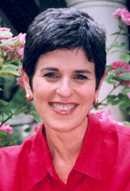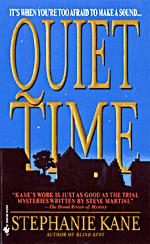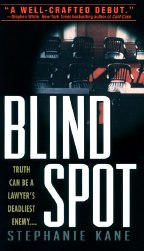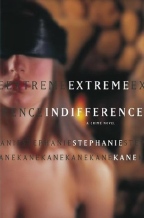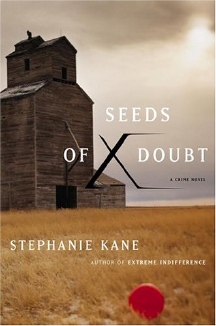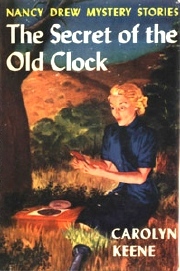"Criminal law is no way to make money."
An Interview With Stephanie Kane
The Agony Column for October 18, 2004
Interview Conducted by Terry D'Auray
Stephanie's bio (from her website) offers insight into her "checkered" past. Born in Brooklyn, educated in Manhattan, she traveled west to college, graduating from the University of Colorado at Boulder with a degree in Italian. Not one to follow the conventional path, she ran a karate studio, then graduated from law school and joined a top-rate Denver law firm specializing in banking law. A mountain climbing expedition to the 17,000 foot heights of Mount Ararat in eastern Turkey led to an epiphany and a return to college to prepare for medical school. Fortunately (for us) medical school wasn't in the cards and Stephanie instead returned to the legal world, this time as a criminal defense trial attorney.
SK: The epiphany began before I went to Turkey. While I was climbing my law firm’s corporate ladder, I’d met several men who had AIDS. Through them I realized I’d been hiding out in banking law; although they were dying, they were more alive than I was. The physical act of climbing Ararat enabled me to face my life-long fear of failure. On my return, I left my firm and went back to college to take the physics and chemistry I’d always been afraid to flunk. TD: What motivated you to add "author" to your already extensive list of accomplishments? And why did you elect to write in the mystery fiction genre? SK: After I resigned from my firm and didn’t get into medical school, I returned to law humiliated and flat broke. Luckily, a criminal defense lawyer was the only one who would hire me. He flung me headfirst into court, and to my surprise I loved it. When you humiliate yourself so spectacularly, you have nothing left to lose! But criminal law is no way to make money. I bought my first computer in 1995 to cut costs, and wrote my first manuscript to learn how to use the computer and because I had a story I wanted to tell.
TD: What inspired you to create a series character with dyslexia? SK: I have a young relative who is learning disabled. In designing Jackie Flowers, I was also trying to break out of the autobiographical trap by giving my heroine a challenge and an advantage I as a lawyer never had. Law is strongly rooted in the written word, but the very best trial lawyers use no notes; taking notes places them a beat behind the action, where they can’t afford to be. Maybe Jackie could be a better lawyer if she wasn’t tied to a legal pad. TD: You, yourself, don't have a learning disability, yet you manage to describe Jackie's dyslexia with authenticity and insight. How do you so effectively "put yourself in those shoes"? Did you do extensive research into learning disabilities prior to writing the novels?
TD: In your novels, Jackie's disability is hinted at and its manifestations are described, but it is never directly labeled as "dyslexia". Only through the course of events in each novel does the reader slowly come to understand what's going on and the degree to which this secret disability shapes and defines Jackie's character. Was this deliberate, and, if so, why? SK: It was deliberate. I didn’t want Jackie to be a “poster child”; rather, I wanted her to be a fully functioning professional who just happens to have a disability – albeit one that affects every aspect of her personal and professional lives. Jackie doesn’t think of herself as “dyslexic” – she dislikes labels in any form. It would have been out of character to describe her by using that term.
SK: Setting is important for several reasons. First, good fiction is anchored in reality. I always visit the places I write about. In addition to taking notes, I carry plastic baggies for sand, earth and plant material to help me bring the setting alive when I’m back at my computer. Second, every element in a thriller must serve character or plot. Setting serves and inspires both. Visiting places to ensure accuracy in even the smallest detail inspires great action scenes; what characters do is a product of who they are, where they grew up and where they live. Finally, Colorado is terrifically diverse; the mountains are quite different from the Eastern Plains, not just geographically but culturally. Boulder has been described as “20 square miles surrounded by reality”. From the perspective of courtroom scenes, this diversity offers a feast: how you pitch a case to a jury can differ widely depending on which part of the state the jurors are from.
SK: I wanted to create a heroine with lots of room to grow. Characters (especially in a series) need an arc: not just a trajectory for change in each book, but throughout the life of the series. Jackie’s arc is coming to terms with growing up dyslexic in a society where she was judged by how well she fit into an educational norm, and all the external and internal conflicts being an outsider poses. Each book brings her one step closer to self-acceptance. TD: You have included in your Flowers' novels the recurring character of Lily, Jackie's pre-teen/teenage neighbor. It's unusual in typical courtroom crime fiction to feature a child, other than as a victim, of course. Why did you elect to do this? SK: Lily brings out Jackie’s nurturing qualities; she’s the daughter Jackie never had. As a child – and a fairly uncompromising one – Lily can also voice certain emotional truths without being censored. Many readers assume the writer’s alter ego is the protagonist, but Lily is the character with whom I identify most. TD: You have another interesting recurring character in the Flowers' novels, that of Pilar, Jackie's investigator. She's a great support for Jackie, a "sidekick" in the best sense of the word. You also reveal new and interesting information about Pilar's background in 'Seeds of Doubt', the latest book. Can you tell us how Pilar came to be? SK: Every hero needs a sidekick. Pilar is not just a confidante; she enables Jackie to function in a profession rooted in the written word, with her secret intact. In assembling a cast of characters, I shoot for the dinner party from hell. Pilar’s earthy humor and robust sexuality (not to mention her own criminal past) challenge Jackie’s assumptions and bring out new facets of Jackie’s character. TD: Do you view your novels primarily as "crime" novels, "psychological suspense" novels or as "courtroom" novels? Or do those sub-genre classifications even matter in your view of your writing? SK: All three, though I never think about that when I’m writing. The heart of my legal stories is the attorney-client relationship; the courtroom is where expectation and reality inevitably collide. Crime fascinates me because we all have the capacity for it; in some ways it represents our most human side. I aim for psychological suspense because I’m most curious about what makes people tick.
SK: There are just so many ways you can write about selecting a jury. I needed a break and thought readers would appreciate one too. And even the most active trial lawyers spend most of their time outside of the courtroom. TD: As a writer of crime fiction, you must of necessity grapple with violence. In your novels, you don't shy away from graphic descriptions of violent acts and their consequences. How do you approach violence in your narratives? SK: Violence makes the impact of crime real, but I’m more interested in its origins and psychological fallout. Each bit of violence must earn its way into my books by providing a springboard for exploring what drives people to violence and the consequences. Gratuitous violence doesn’t interest me at all. TD: As the author of four novels now, can you describe how you have matured as a writer? SK: I hope I’ve matured in terms of both subject matter and style. BLIND SPOT was a serial killer book. EXTREME INDIFFERENCE is about the effects of unbridled power. SEEDS OF DOUBT is about a “bad seed” who committed a crime when she was a child, goes to prison for 30 years, and is charged with a similar crime when she gets out. Jackie’s empathy for this woman as an outcast makes her stakes in taking the case much more personal. When I turned to fiction after practicing law for so many years, my biggest hurdle was stylistic: re-learning to use the English language. Lawyers are trained to focus on what’s “relevant”; i.e., the narrowest facts and arguments geared to winning your case. This tunnel vision is the antithesis of what good fiction writers should cultivate. I’ve had to retrain both my eye and my ear. With each book, I try to streamline my sentence structure and use the simplest word that most clearly expresses my meaning.
SK: I devoured Nancy Drew when I was a child, and was addicted to the short stories in Alfred Hitchcock’s Mystery Magazine. I’ve been inspired as much by those writers as by Patricia Highsmith, Denise Mina and P.D. James. TD: How do you go about constructing a new novel? Do you outline it beforehand, or simply let it flow? Do you write to a disciplined schedule or take an "as inspired" approach? SK: If I waited for inspiration, none of my books would be on the shelves. The most important part of my process is the work I do before writing a single word. I spend a great deal of time trouble-shooting a concept to make sure it has the depth to support a full-length novel, then I design the story arc. Because scenes are the structural and dramatic microcosm of the book, next comes a scene outline, where I focus on goal (the emotional effect I want to create), setting, visual images, role in spine, point of view, conflict, subtext, turning point, etc. I outline not to create a script to follow when writing the manuscript, but to force myself to slow down and get as deep as possible into character and plot before I start to write. Great concepts are squandered by rushing them into print. Once the words hit the page, they don’t want to change. TD: For all the budding authors out there, can you describe the experience of getting your first book published? Was it a hit on the first try or do you have stacks of rejection letters (or is it something in between)? SK: BLIND SPOT, my first published book, was my fourth completed manuscript. I’d been writing for five years before it was published, including a year to find an agent and a year for her to place it. TD: Any thoughts about being a female author writing a female protagonist? Do you think most of your readers are women and, if so, do the sensibilities of a female audience influence your narrative? Have you been influenced by any particular women writers? SK: I don’t think of myself as a female author, and I try not to write to any specific audience. The hardest part is coming up with new things for Jackie to wear! I’m glad I made her attractive, though, because many male lawyers have told me they’d like to share office space with her. TD: What can we expect from you next? What are you working on now? SK: More Jackie Flowers, until her arc is completed. I’ve finished a sequel to SEEDS OF DOUBT and have started working on the one to follow. After that, I don’t know. No series should outlive its readership, and when Jackie stops growing it will be time to write something else. |
